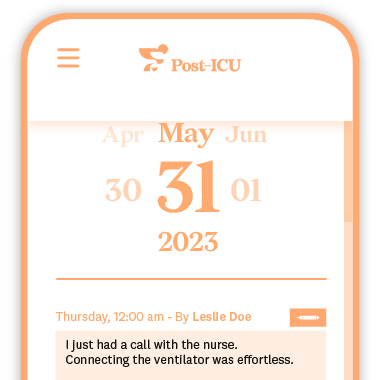Intensive care units save lives but the measures they take come with a lasting impact for many people. Studies show1Burdick, K., & Callahan, C. (2020). Sleeping Soundlessly in the Intensive Care Unit. Multimodal Technol. Interact., 4, 6.2Abbas, A., Zayed, N., & Lutfy, S. (2019). Post ICU syndrome among survivors from respiratory critical illness. A prospective study. Egyptian Journal of Bronchology, 13, 505-509.3Wang, S., Hanneman, P., Xu, C., Gao, S., Allen, D., Golovyan, D., Kheir, Y., Fowler, N., Austrom, M., Khan, S., Boustani, M., & Khan, B. (2019). Critical Care Recovery Center: a model of agile implementation in intensive care unit (ICU) survivors. International Psychogeriatrics, 32, 1409 – 1418. 50% to 75% of survivors experience some form of Post-Intensive Care Syndrome (PICS). This complex condition, marked by physical, cognitive, and emotional symptoms, not only affects patients’ quality of life but also significantly burdens healthcare systems.
While eradicating PICS remains a challenge, research is offering promising solutions for prevention. Studies have shown that ICU diaries, digital journals designed for patients and families, can be a powerful tool. ICU diary programs have been linked to improvements in patient outcomes such as reduced anxiety and depression, potentially leading to faster and smoother recovery.
What is an ICU Diary?
A digital ICU diary is a tool used in critical care settings, by patients, families, and ICU staff to document a patient’s ICU experience. Some of the key features of digital ICU diaries are:
- Multiple contributors: The diary is ideally a collaborative effort, allowing patients, families, and medical staff to create entries and updates on the patient’s journey.
- Timely updates: ICU diaries can be updated frequently, providing a detailed record of the patient’s progress throughout their stay.
- Multimedia: Some ICU diaries incorporate multimedia elements like photos or videos, which can be helpful for memory recall later.
- Security and privacy: ICU diaries prioritize maintaining confidentiality. They typically employ secure logins and access controls to ensure that only authorized users can view the diary entries.
Benefits of Using an ICU Diary
Improving patient outcomes while optimizing resource allocation is a top priority for hospitals. ICU diaries offer a powerful tool to achieve both goals, delivering significant benefits:
Reduced Readmission Rates and Lower Costs
Studies indicate that PICS can lead to higher readmission rates and longer recovery times, putting a strain on hospital resources. ICU diaries can help prevent PICS by promoting better communication and support, potentially leading to fewer complications and quicker recoveries, ultimately reducing readmission rates and associated financial burdens.4Jones, C., Bäckman, C., Capuzzo, M. et al. Intensive care diaries reduce new onset post-traumatic stress disorder following critical illness: a randomised, controlled trial. Crit Care 14, R168 (2010). 5Hu, D., Ji, X., Li, Y., Liang, Y., & Chen, J. (2023). Effect of intensive care unit diary on quality of life of intensive care unit survivors and their relatives: A systematic review and meta‐analysis. Nursing Open, 10(8), 4985-4994.
Focus on Patient Care and Communication
ICU diaries foster a collaborative care environment. Families feel more involved and informed, while medical staff can use the diary entries for easier communication with families. This can lead to better personalized care plans and a more positive patient experience.
Reduced Staff Burden and Increased Efficiency
Streamlining communication through ICU diaries can free up valuable time for your clinical staff. ICU staff can create entries with updates about patients daily, minimizing the need for repetitive explanations and phone calls. This can lead to increased efficiency and improved staff satisfaction.
Security and Compliance
Digital ICU diaries prioritize data security and privacy. They comply with standard US hospital security, legal, and privacy regulations, ensuring patient confidentiality.
Seamless Integration
Implementing an ICU diary system is simple. Digital ICU diary solutions offer easy integration with existing hospital systems, minimizing disruption to your workflow.
Discover how Griffin Hospital increased their ICU patient experience effectively with Post-ICU.
Implement the Post-ICU Diary in Your Hospital in Less Than 4 Weeks
Introducing a digital diary system into your ICU is a powerful step towards better patient outcomes, streamlined workflows, and a more supportive environment.
Post-ICU Diary delivers all the benefits outlined above. A tested and trusted solution currently used in over 25 hospitals, Post-ICU Diary is ready to make a positive impact in yours. Our team is eager to discuss how we can seamlessly integrate the Post-ICU Diary into your existing systems





